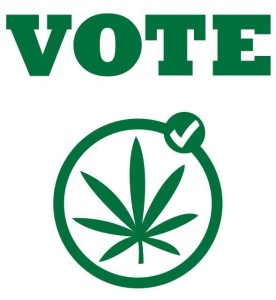Election Day 2014 marked a major turning point in the movement to reform marijuana laws. Two new states legalized recreational pot by substantial margins, as did Washington, D.C. A major medical marijuana initiative failed in Florida, but it was the only setback of the day.
 So what does all this mean for the future of cannabis policy in California?
So what does all this mean for the future of cannabis policy in California?
Above all, the election results serve as a sign that legalization is coming to the Golden State, fast. Efforts to put the issue on the ballot this year failed but a more serious effort is planned for 2016.
California is now next in line to make pot legal. And if the results Nov. 4 are any indication, Californians are likely to go along with the idea.
Voters in both Oregon and Alaska legalized weed on Election Day. The Oregon initiative passed with 54 percent of the vote while the Alaska measure passed with 52 percent.
Both those margins were larger than many pollsters and observers predicted, especially in Alaska, where late polls showed a tied race. It was yet another sign that reform fever is sweeping the country.
Voters in the District of Columbia also legalized recreational cannabis, passing the city’s ballot measure with a whopping 70 percent of the vote. That’s the widest margin yet for legal marijuana.
All three of these victories are momentous. They came during midterm elections with record-low turnout, typically a moment when anything remotely progressive is doomed to failure.
The whole of the Pacific Northwest is now legal, including Alaska. All that remains on the West Coast is California, and weed is already half-legal here.
Voters in California approved the Compassionate Use Act in 1996, making it the first state to adopt medical marijuana. That program was put into effect with few state-level regulations, leaving local communities to constrain the industry with zoning rules and other ordinances.
The lack of regulation quickly turned the medical market into a quasi-legal recreational market. It’s easy to obtain a physician’s recommendation in California, regardless of health conditions. And pot shops abound, at least in some parts of the state.
 That makes California an ideal place to legalize. Among other things, a legal recreational market promises greater regulation and state control.
That makes California an ideal place to legalize. Among other things, a legal recreational market promises greater regulation and state control.
Polls suggest the state is ready. Surveys routinely show more than half of Californians want to legalize. The 2014 ballot proposals failed primarily because they lacked funding, not because voters didn’t support them.
The 2016 effort started quietly several months ago and has drawn the ACLU, Lt. Gov. Gavin Newsom, and other heavy hitters in the reform movement. That year will feature an open presidential race, the kind of contest that typically draws large numbers of young voters – exactly the type who most support legalization.
 California Marijuana Market Breaking "Marijuana News" from CA
California Marijuana Market Breaking "Marijuana News" from CA

